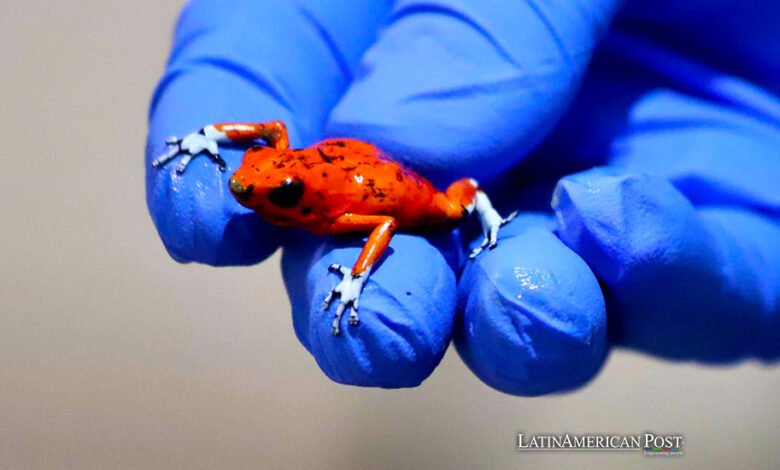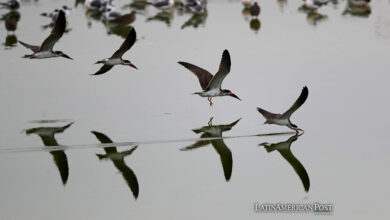Brazilian Caught Smuggling Endangered Frogs at Bogotá Airport

In a shocking wildlife trafficking incident, Bogotá police apprehended a Brazilian woman at El Dorado Airport for carrying a suitcase with 130 endangered poisonous frogs, sparking a significant investigation into the international animal trade.
Smuggling Operation Unveiled at Bogotá’s El Dorado Airport
Bogotá’s El Dorado Airport became the center of an alarming wildlife trafficking case when a 37-year-old Brazilian woman was detained for smuggling 130 endangered poisonous frogs. This startling discovery, announced by Juan Carlos Arévalo, the operational commander of the Bogotá Police, highlights the ongoing battle against illegal animal trade.
En route to Sao Paulo with a layover in Panama, the woman intended to sell these rare ‘Oophaga Histrionica’ species, also known as ‘Harlequin Poison Dart Frogs.’ Authorities revealed that the Brazilian claimed the frogs were a “gift received from ethnic communities in Nariño.” However, the sheer number of these endangered creatures and their evident symptoms of asphyxiation led to immediate legal proceedings for wildlife trafficking.
Native to the humid forests of the Pacific, the ‘Oophaga Histrionica’ is a species in dire peril. Its rarity has made it a coveted item in international markets, where collectors are willing to pay up to $1,000 per frog. The lucrative nature of this illegal trade poses a significant threat to the survival of these and other endangered species.
A Grim Indication of the Trade’s Cruelty
Upon their discovery, the frogs were in critical condition, “only hours from death,” as stated by Commander Arévalo. They were promptly transported to a veterinary center for urgent care. The poor conditions in which the frogs were found underscore the cruelty and recklessness often involved in the illegal wildlife trade.
Thankfully, there is a glimmer of hope for these rescued amphibians. Following their recovery from the health complications suffered due to their unlawful capture and transportation, authorities anticipate that these frogs can be returned to their natural habitat.
The incident raises serious questions about the adequacy of international efforts to combat wildlife trafficking. The Brazilian woman did not possess the necessary legal documents, including a unique national mobilization safe-conduct and a wildlife utilization permit, leading to her being placed under the Fiscalía General de la Nación (National Attorney’s Office) custody.
Colombia’s Ongoing Struggle Against Wildlife Trafficking
This case is not an isolated incident but part of a more significant, more disturbing trend in wildlife trafficking. With its rich biodiversity, Colombia has become a hotspot for such illegal activities. The demand for exotic pets and high-value animal products fuels a black market that endangers species and disrupts ecosystems.
The apprehension of the Brazilian woman in Bogotá is a stark reminder of the ongoing challenges in wildlife conservation. While international laws and treaties exist to protect endangered species, enforcement remains a significant hurdle. This incident demonstrates the importance of vigilance and stringent checks at transportation hubs, crucial points in the chain of wildlife smuggling.
Protecting Biodiversity from Illegal Trade
The fate of the Harlequin Poison Dart Frogs is emblematic of the broader struggle to protect endangered species from the clutches of illegal trade. Conservationists and environmentalists call for increased international cooperation and more robust legal frameworks to deter wildlife trafficking. Public awareness and education about the detrimental effects of such activities are also essential in curbing the demand that drives this illicit market.
Also read: Record Drought in Amazon as Climate Change Intensifies Environmental Crisis
The Bogotá airport incident is a sobering example of the challenges facing wildlife conservation today. It highlights the need for a concerted global effort to tackle the illegal wildlife trade—a threat that endangers not just individual species like the ‘Oophaga Histrionica’ but the biodiversity that sustains our planet.





